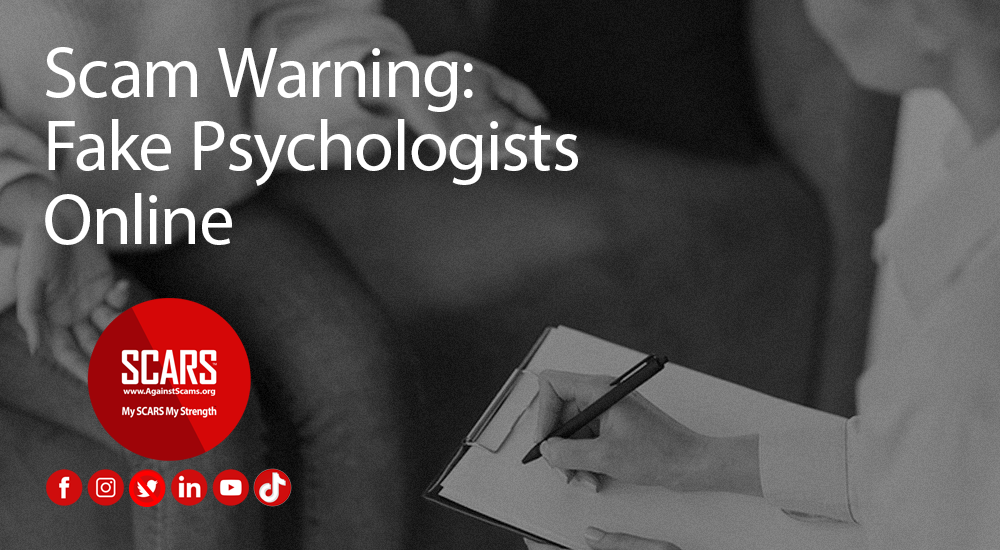A New Romance Scam – Fake Psychologists & Therapists!
Scammers recognize that scam victims are traumatized and now want to capitalize on that!
Now We Have Fake Psychologists, Counselors, & Therapists!
SCAM WARNING: No real psychologist or other mental health professional is going to contact you unsolicited on social media or by phone!
As SCARS continues to focus on the wellbeing and emotional care of scam victims, the scammers have seen an opportunity!
A BBC article spells out the problem:
Mental health and scams: ‘I’d have paid anything to make me feel better’
Emma Quinn was at her most vulnerable when a so-called psychologist contacted her on Facebook offering to help.
As someone with bi-polar disorder, the 28-year-old was in a manic phase when a woman offered support.
“At that point I would have paid anyone any sum of money to make me feel better,” she said.
That sum turned out to be £6,000 and it would take Emma two years – and a great deal of stress – to get the money back.
Now a charity is calling on the government to protect people like Emma, claiming its plans to legislate on online safety ignores the scourge of scams.
The Money and Mental Health Policy Institute said its research suggested people with mental health problems were three times more likely to have been victim of an online scam than the wider population.
Emma faced the financial impact of such a scam after she was pressurised into handing over thousands of pounds she did not have.
After being given a 24-hour deadline by the supposed psychologist, she borrowed £3,500 from a friend, telling them it was for rent even though
Emma was living at her parents’ home.
“When I’m manic I can find money anywhere,” she said.
She also used £1,500 when her credit card limit increased automatically and then paid a further £1,000.
“It was actually my dad who had seen my PayPal account I’d left logged in on his laptop by accident one day and he said “who on earth is this woman?’, I couldn’t really explain it and he said to immediately stop this ‘It isn’t right, you’re not well’.”
It caused a temporary rift, but he was correct, and after receiving medical help, she recognised she had been taken advantage of.
Following a period of depression and pursuit through legal channels, she managed to get £5,000 back, but said the whole episode had been very stressful.
“This was done on Facebook and I definitely think they could have done more because I did contact them at one point to say ‘this is what has happened, could I archive the conversation?’ and it didn’t really go anywhere,” she said.
“She had blocked me and it wouldn’t let me recover her side of the conversation.”
She said manic episodes left her and others open to financial exploitation, and supported calls to allow people to opt out of messages about credit on websites.
Epidemic of scams
A survey by the Money and Mental Health Policy Institute found suggested that people with mental health problems were twice as likely than others to say that easy access to credit online led them to spend more than they could afford.
They were also twice as likely to feel under pressure to spend when online.
This, according to the institute, should be reflected in the government’s Online Safety Bill.
Martin Lewis, founder of the charity, as well as the Moneysavingexpert website, said: “I simply don’t understand how an Online Safety Bill can simply exclude the epidemic of scams the UK faces. Scams don’t just steal people’s money, it often takes their self-respect and mental health too.
“The government has promised to set world-beating standards for online safety, but as it stands the Online Safety Bill will utterly fail to protect people from the growing threat posed by online scammers, especially to vulnerable people.”
A government spokeswoman said: “We recognise the concerns about the growth in scale and complexity of online scams and fraud, and we continue to work closely with industry, regulators and law enforcement partners to pursue fraudsters, close down the vulnerabilities they exploit and make sure people have the information they need to spot and report scams.”
Improper Approaches
Generally speaking, it is improper and in many cases illegal for certain professionals to solicit clients – this includes lawyers, doctors, and certain financial professionals. It does not mean they cannot advertise, but it does mean they cannot reach out to individuals without prior request by that individual.
We have seen all manner of “professionals” reach out and contact online crime victims, these include:
- Fake Private Investigators
- Fake Money Recovery Companies
- Fake Attorneys
- Fake Financial or Investment Advisors
- Fake Police & Law Enforcement
- Fake or Amateur Anti-scam Groups
- And Now Fake Mental Healthcare Counselors, Therapists, or Psychologists
In all of these cases, no real professional would reach out this way without some form of prior contact and authorization or request.
If anyone tries to contact you and you have not asked for their help, by definition this is not legit – it is a scam. Of course, we do not mean advertisements, we mean contacting you via:
- Social Media Messaging
- Text Messages
- Phone Calls
- Emails
- Replying to Posts or Comments on Websites or Social Media
If anything like this happens, simply disregard it and report it to the Federal Trade Commission at www.FTC.gov/complaint
TAGS: SCARS, Information About Scams, Anti-Scam, Scams, Scammers, Fraudsters, Cybercrime, Crybercriminals, Romance Scams, Scam Victims, Online Fraud, Online Crime Is Real Crime, Scam Avoidance, Fake Counselors, Fake Therapists, Fake Psychologists
PLEASE SHARE OUR ARTICLES WITH YOUR FRIENDS & FAMILY
HELP OTHERS STAY SAFE ONLINE – YOUR KNOWLEDGE CAN MAKE THE DIFFERENCE!
THE NEXT VICTIM MIGHT BE YOUR OWN FAMILY MEMBER OR BEST FRIEND!
By the SCARS™ Editorial Team
Society of Citizens Against Relationship Scams Inc.
A Worldwide Crime Victims Assistance & Crime Prevention Nonprofit Organization Headquartered In Miami Florida USA & Monterrey NL Mexico, with Partners In More Than 60 Countries
To Learn More, Volunteer, or Donate Visit: www.AgainstScams.org
Contact Us: Contact@AgainstScams.org






Please Leave A Comment - Tell Us What You Think About This!